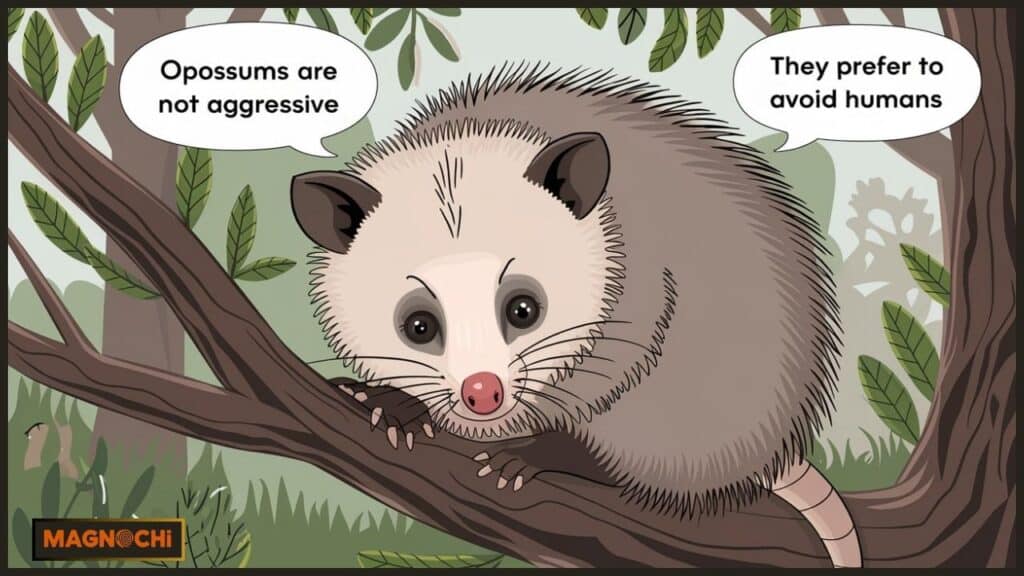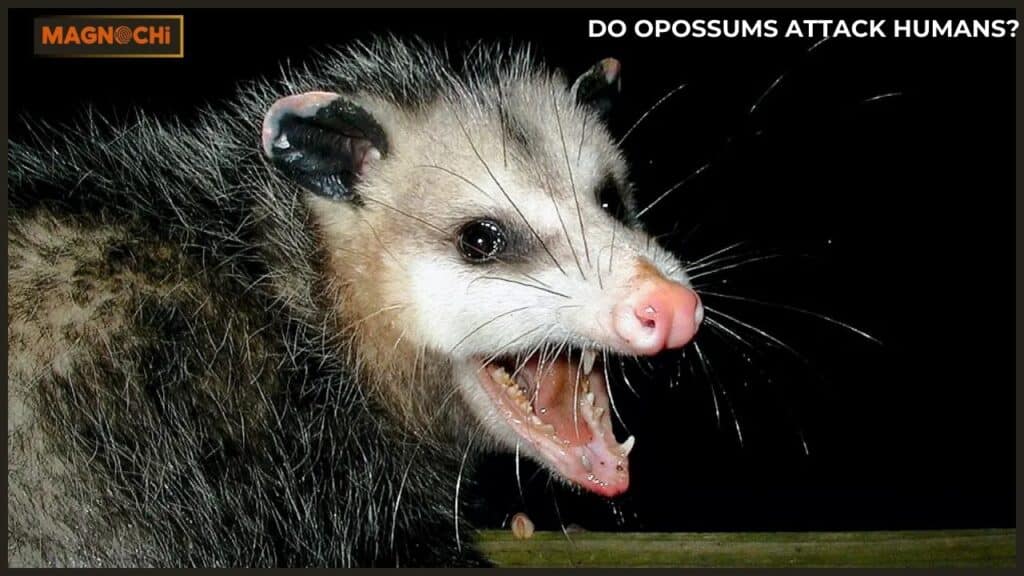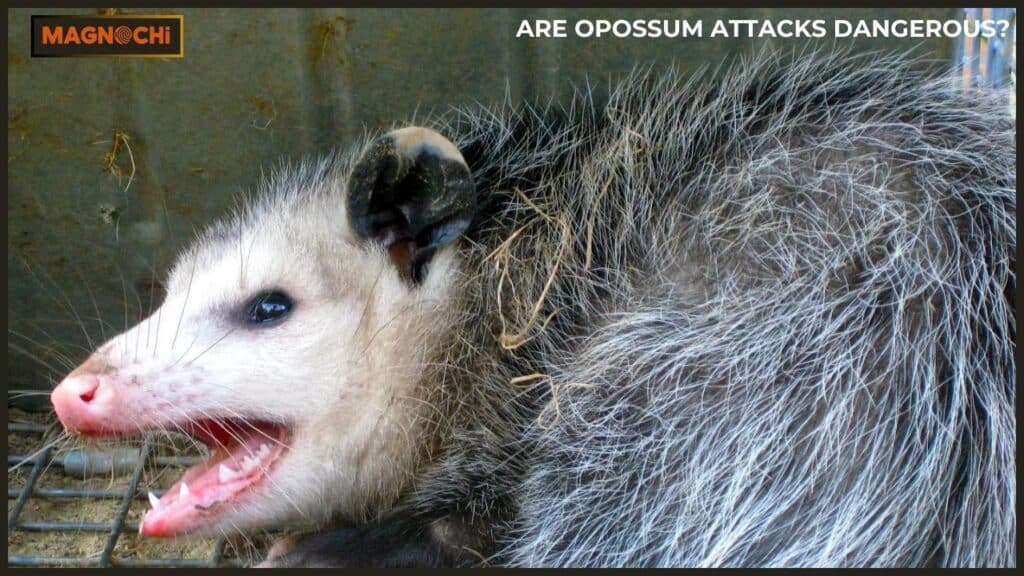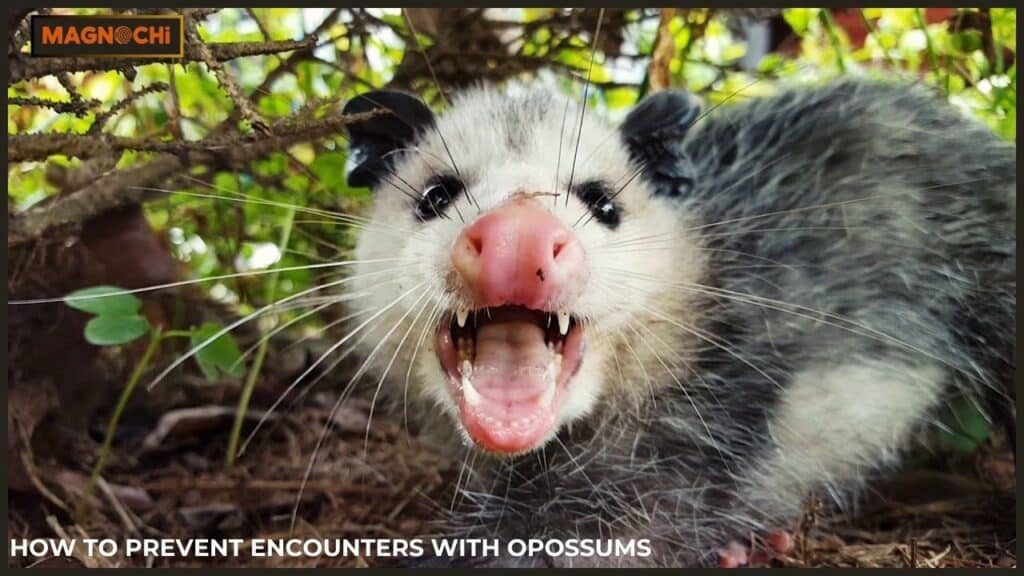Do Opossums Attack Humans? Opossums have long been an intriguing subject of fascination for wildlife enthusiasts and ordinary people alike. Their striking appearance, nocturnal habits, and peculiar behaviors often create an air of mystery.
Among the most persistent myths surrounding opossums is the question: Do opossums attack humans? Many people assume these creatures are dangerous or aggressive, especially after hearing exaggerated stories about their behavior.
However, in reality, opossums rarely pose a threat to humans. In this post, we will explore the truth behind these myths, providing a comprehensive analysis of opossum behavior, their defensive mechanisms, and the risks involved in human-opossum interactions.
What Are Opossums?
Opossums belong to the marsupial family, specifically Didelphidae, with the most common species being the Virginia opossum (Didelphis virginiana), native to North America.
These nocturnal creatures have a fascinating set of physical and behavioral characteristics that distinguish them from many other animals.
Physical Characteristics
Opossums are medium-sized creatures with distinct features that make them stand out in the animal kingdom. Here’s a closer look at their appearance:
- Size: Adult Virginia opossums typically weigh between 4 and 14 pounds. Their body length, excluding the tail, ranges from 24 to 36 inches.
- Tail: One of the most notable features of the opossum is its prehensile tail. This tail acts almost like a fifth limb, allowing them to grip branches, balance while climbing, and even carry food.
- Face: Opossums have a sharp snout with a set of sharp teeth designed for their omnivorous diet. They also have large, dark eyes and expressive features, making them easily recognizable.
- Fur: Their fur is generally grayish, with white markings on the face and ears. Despite their somewhat eerie look, opossums are not aggressive animals.
These features allow opossums to thrive in a variety of environments, including suburban areas, where human encounters are most likely to happen. [Do Opossums Attack Humans?]
Habitat and Behavior
Opossums are primarily nocturnal, meaning they are most active during the night. They are opportunistic feeders and are often found scavenging through trash cans, garbage bins, and gardens in urban and suburban areas.
Their diet consists of fruits, insects, small animals, and decaying matter.
Opossums are also solitary creatures, unlike other mammals like raccoons that may live in groups. They are highly adaptable, thriving in both natural and urban settings. Their ability to climb trees and navigate through tight spaces makes them well-suited for urban life.

Opossums’ Role in the Ecosystem
While opossums may sometimes seem like nuisances due to their scavenging behavior, they actually play a vital role in maintaining a balanced ecosystem. Here’s how:
Natural Pest Control
Opossums are remarkable pest controllers. As part of their omnivorous diet, they consume a significant number of insects, including ticks.
In fact, opossums are considered one of the best natural defenses against tick populations, helping to reduce the spread of tick-borne diseases like Lyme disease. [Do Opossums Attack Humans?]
A single opossum can eat thousands of ticks in a single night, preventing these harmful pests from multiplying and spreading diseases to humans and other animals.
Decomposing Matter
In addition to their tick-eating habits, opossums help clean up the environment by eating decomposing organic matter, such as dead animals, fruit, and plant material.
Their scavenging behavior accelerates the natural process of decomposition, enriching the soil and contributing to a cleaner environment.
Habitat Management
Opossums also help regulate the population of small mammals, birds, and insects, which can otherwise become overwhelming in certain environments.
By controlling pest populations, opossums maintain a balanced ecosystem that supports biodiversity.
Do Opossums Attack Humans?
The notion that opossums attack humans is a common misconception fueled by myths and misunderstandings. [Do Opossums Attack Humans?]

In reality, opossums are non-aggressive and prefer to avoid confrontation whenever possible. However, they do have defensive mechanisms in place to protect themselves when they feel threatened.
Opossum Behavior: Non-Aggressive and Shy
Opossums are not territorial and are not naturally inclined to attack. They are shy creatures that prefer to stay out of the way of humans.
When encountered, opossums will often try to escape or hide rather than engage in any form of aggression. Here are some key aspects of their behavior:
Flight Over Fight
Unlike other animals that may become aggressive when threatened, opossums generally adopt a flight-first strategy. When confronted by humans or potential predators, they will try to flee the situation.
If they are unable to escape, they may resort to other defensive mechanisms like playing dead or using physical displays of aggression (hissing or baring teeth).
Thanatosis: Playing Dead
One of the most fascinating defense mechanisms in opossums is thanatosis, commonly known as “playing dead.” When threatened, an opossum will collapse onto its side, stop moving, and release a foul-smelling fluid from its anus.
This mimicry of death is meant to deter predators that prefer fresh prey. Opossums have evolved this behavior as an effective way to avoid becoming a meal. [Do Opossums Attack Humans?]
Hissing and Barred Teeth
If an opossum feels cornered and has no chance of escape, it may hiss loudly or bare its teeth in an attempt to intimidate the perceived threat. This is a last-ditch defensive strategy, meant to warn predators or intruders to back off.
Defensive Aggression: Rare Instances of Biting
While rare, defensive aggression can occur if an opossum feels it is in immediate danger. In these extreme cases, the opossum may bite in self-defense.
However, opossums are not naturally inclined to bite unless there is no other option for escape.
These defensive bites are typically minor, and opossums do not pose a significant danger to humans.

Are Opossum Attacks Dangerous?
Although the likelihood of an opossum attacking a human is extremely low, it’s essential to understand the potential risks associated with any animal bite.
Bite Severity
Opossum bites, while uncommon, can happen if the animal is startled, cornered, or feels threatened. Bite severity is generally mild to moderate.
The sharp teeth of an opossum can cause minor puncture wounds, which are typically not life-threatening. However, as with any bite, there is a risk of infection.
Health Concerns: Diseases Associated with Opossums
Opossums can carry various diseases, some of which can be transmitted to humans through bites, scratches, or contact with their urine or feces. While the risk is relatively low, it’s still important to be aware of potential health concerns:
Rabies
One of the most common fears surrounding wild animals, including opossums, is rabies. However, opossums are not common carriers of the rabies virus. [Do Opossums Attack Humans?]
This is due to their relatively low body temperature, which makes it difficult for the virus to thrive. In fact, opossums have a very low incidence of rabies compared to other wild mammals like raccoons or bats.
Leptospirosis
Opossums can carry Leptospirosis, a bacterial infection that is typically transmitted through contact with animal urine.
Although rare, humans can become infected if they come into contact with contaminated water or surfaces where opossum urine has been deposited.
Salmonella
Opossums are also known to carry Salmonella, particularly in their droppings. While Salmonella is more commonly transmitted through contact with contaminated food or water, the risk of exposure increases if you handle opossum feces or are bitten.
Tick-borne Illnesses
Despite their role in controlling tick populations, opossums themselves can sometimes carry ticks. Tick-borne illnesses, such as Lyme disease, can be contracted if an infected tick bites a human. However, opossums help reduce overall tick populations, minimizing the overall risk of transmission.

How to Prevent Encounters with Opossums
Even though opossums are generally harmless, it’s still wise to take precautions to avoid unnecessary interactions. Here are some tips on how to prevent encounters with opossums:
Securing Your Property
- Seal Entry Points: Make sure all holes, cracks, or gaps in your home or garage are sealed to prevent opossums from entering your attic, basement, or crawl space.
- Secure Garbage Bins: Keep trash bins tightly sealed, as opossums are attracted to food scraps. Ensure that lids are secure and try using animal-proof containers.
- Remove Pet Food: Never leave pet food outside overnight, as this can attract opossums and other wildlife.
Humane Deterrents
If you have a persistent opossum problem, here are some humane ways to deter them:
- Motion-Activated Lights: Bright lights that turn on when motion is detected can startle opossums and make them feel unsafe in your yard.
- Strong Odors: Some people use natural repellents, like ammonia, cayenne pepper, or even predator urine, which opossums find unpleasant.
Safe Interaction with Opossums
If you encounter an opossum, it’s important to remain calm and ensure both your safety and the animal’s well-being.
What to Do if You Spot an Opossum
- Do not approach: If the opossum appears healthy, leave it alone. They are likely searching for food or shelter and will move on.
- Call professionals: If the opossum appears sick, injured, or trapped, contact a local wildlife control service to safely handle the situation.
Pet Safety
While opossums generally pose no threat to pets, it’s best to keep pets indoors at night or supervise them when outside. Dogs or cats may provoke an opossum, leading to a defensive bite.
Final Verdict: Do Opossums Attack Humans?
The answer to whether opossums attack humans is a resounding no. These fascinating creatures are more interested in avoiding conflict than engaging in it. Their non-aggressive behavior and reliance on defensive tactics, such as playing dead, make them unique among wildlife.
While it is possible to be bitten by an opossum in rare circumstances, the bite is generally not severe and can be treated with basic first aid. Opossums are beneficial creatures that contribute to the health of our ecosystems by controlling pests like ticks and cleaning up decaying matter.
By understanding their behavior and taking a few preventive measures, we can live peacefully alongside these often-misunderstood animals. [Do Opossums Attack Humans?]
FAQs
Do Opossums Carry Diseases?
Yes, opossums can carry Leptospirosis, Salmonella, and ticks that carry Lyme disease, but the risk of transmission to humans is relatively low.
What Should I Do if an Opossum Bites Me?
If bitten, clean the wound thoroughly with soap and water and seek medical attention. Your doctor may recommend a tetanus shot or rabies treatment.
Can Opossums Harm Pets?
While opossums typically pose no threat to pets, it’s best to supervise pets outside to prevent any confrontations.
Are Opossums Aggressive by Nature?
No, opossums are generally non-aggressive and prefer to avoid conflict.
How Can I Safely Remove an Opossum from My Property?
Contact a professional wildlife control service to handle the humane relocation of opossums without causing harm.
Conclusion
Opossums are remarkable creatures, misunderstood and often feared for their appearance and nocturnal habits. However, when we take the time to understand their true nature, it becomes clear that these animals are not dangerous to humans.
Their non-aggressive behavior, defensive tactics, and ecological role make them fascinating and essential to the health of our environment.
By respecting their space and taking proper precautions, humans and opossums can coexist peacefully, and we can continue to appreciate the many benefits these marsupials bring to our ecosystems. [Do Opossums Attack Humans?]









